
-
Encuentra el alimento adecuado para tu mascotaResponde este cuestionario para ver qué comida es mejor para tu amigo peludo.Encuentra el alimento adecuado para tu mascotaResponde este cuestionario para ver qué comida es mejor para tu amigo peludo.Categoría de SaludProductos Destacados
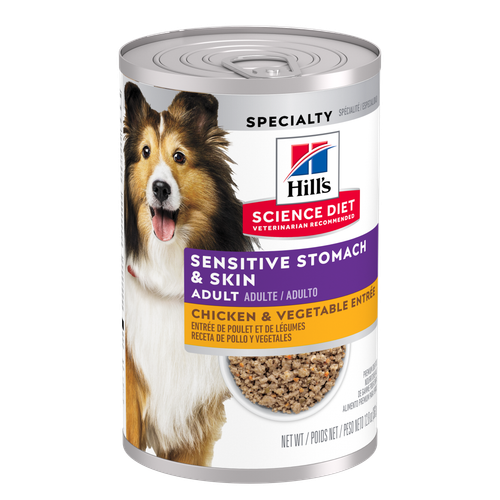
Pollo, arroz de cervecería, harina de pollo, guisantes amarillos, cebada perlada quebrada, sorgo entero, producto de huevo, grasa de pollo, aceite de soya, arroz integral, pulpa de remolacha desecada, saborizante de hígado de pollo, ácido láctico, saborizante de hígado de cerdo, cloruro de potasio, linaza, vitaminas (complemento de vitamina E, L-ascorbil-2-polifosfato (fuente de vitamina C), complemento de niacina, mononitrato de tiamina, complemento de vitamina A, pantotenato de calcio, complemento de riboflavina, biotina, complemento de vitamina B12, clorhidrato de piridoxina, ácido fólico, complemento de vitamina D3), sal yodada, cloruro de colina, taurina, minerales (sulfato ferroso, óxido de zinc, sulfato de cobre, óxido manganoso, yodato de calcio, selenito de sodio), tocoferoles mixtos para la frescura, fibra de avena, sabores naturales, beta caroteno, manzanas, brócoli, zanahorias, arándanos, guisantes verdes.
Shop Now
Mejora la capacidad diaria de levantarse y andar
Shop Now Alimento para perros Adult Light con HígadoShop NowCategoría de SaludProductos Destacados
Alimento para perros Adult Light con HígadoShop NowCategoría de SaludProductos Destacados Shop Now
Shop Now Hill's Science Diet Kitten, alimento para gatitosShop Now
Hill's Science Diet Kitten, alimento para gatitosShop Now
Hill's Prescription Diet i/d Dry Dog Food es una nutrición altamente digerible y de gran sabor clínicamente probada para ayudar a calmar los trastornos digestivos. Fortificado con la tecnología de ingredientes ActivBiome+ patentada de Hill's, que ha demostrado clínicamente que activa rápidamente el microbioma intestinal para respaldar la salud y el bienestar digestivos.
Shop Now -
Perro
- Consejos y Artículos Sobre Perros
-
Categoría de Salud Canina
- Peso
- Sensibilidad Alimentaria y Medioambiental
- Urinario
- Digestivo
- Articulación
- Renal
-
Etapas de la Vida del Perro
- Nutrición del Cachorro
- Nutrición de Adultos
- Nutrición para Mayores
Gato- Consejos y Artículos Sobre Gatos
-
Categoría de Salud Felina
- Peso
- Piel y Sensibilidad Alimentaria
- Urinario
- Digestivo
- Renal
- Bola de Pelo
- Interior
-
Etapas de la Vida del Gato
- Nutrición de los Gatitos
- Nutrición de los Adultos
- Nutrición de los Mayores
Artículos Destacados ¿Qué nutrientes pueden ayudar al sistema inmunitario de tu mascota?
¿Qué nutrientes pueden ayudar al sistema inmunitario de tu mascota?Descubre cómo los antioxidantes y los aminoácidos pueden ayudar a mejorar el sistema inmunitario de tu mascota y qué debes buscar en un alimento para mascotas
Leer más Las diferencias del envejecimiento entre humanos y mascotas
Las diferencias del envejecimiento entre humanos y mascotasAlguna vez has observado a tu perro o gato y te has preguntado, “¿Qué edad tendrá?” Las mascotas al envejecer pueden verse un poco canosas o caminar un poco más despacio, pero puede ser difícil saber exactamente cómo están madurando tus mascotas de edad avanzada.
Leer más Cómo leer una etiqueta de alimento para mascotas
Cómo leer una etiqueta de alimento para mascotas¿Es mejor el alimento alto en proteína para tu mascota? La realidad del alimento para mascotas es que debe ser balanceado. Aunque la proteína necesita ser parte de ese balance, demasiada cantidad puede no ser lo mejor para tu mascota. Es imprescindible que los dueños de las mascotas comprendan la importancia de la proteína, y también sepan qué otros ingredientes buscar en los alimentos para perros y gatos.
Leer más -

 La nutrición basada en la ciencia genera diferencias en las que puedes confiar
La nutrición basada en la ciencia genera diferencias en las que puedes confiar
Digestive health for dogs
Digestive health for dogs
What are dog digestive issues?
A digestive disorder is any health situation that prevents your dog from properly digesting food or alters the rate that food passes through their digestive tract. Don’t ignore the signs! If your furry friend is showing symptoms of digestive disorders, seek immediate advice from your veterinarian.

Know the signs of distress
Some signs of your dog’s digestive problems are easy (and unpleasant) to spot. Make sure you consult with your vet if your dog shows any of these signs:








Know the signs of distress
Some signs of your dog’s digestive problems are easy (and unpleasant) to spot. Make sure you consult with your vet if your dog shows any of these signs:








What causes dog digestive problems?
Digestive upsets can happen for a variety of reasons, and all of them can make your dog feel under the weather. Here are some of the more common causes of digestive problems in dogs.


This is the most common cause of an ‘upset stomach’ in dogs. It usually consists of vomiting and diarrhea that begins suddenly but can just be diarrhea too. It can be caused by lots of things like eating something unsavoury (we all know our dogs love doing this!), parasites, viruses and foreign bodies, to name but a few.
Unlike the sudden onset upset we just mentioned, chronic enteropathies are slower to appear and tend to last a long time. Diarrhea and weight loss are common signs. Again, it can be caused by many different things such as adverse food reactions and genetics.
The colon is part of the large bowel and when this gets inflamed it’s called colitis. It’s usually very characteristic and most dogs show the same signs - looking like they urgently need to have a poop, they might strain to have a poop but not much comes out, and one of the classic signs of colitis is fresh blood and/or slimy mucus in the stools.
This is a serious condition in dogs and can be life-threatening. Common signs of pancreatitis are sudden onset vomiting, depression and lack of appetite. It’s also a very painful condition so your dog may be restless and adopt the ‘play bow’ position to try to ease the pain. If you have any concerns that your dog might have pancreatitis get them to the vet as soon as you can.
This complicated-sounding name describes a condition where dogs are lacking certain enzymes needed for digestion. The pancreas produces some of these and when they are lacking the food passes straight through without the dog being able to get at the nutrients. Dogs with EPI tend to be ravenously hungry but still lose weight and look in poor condition. Because they don’t digest fat well, their stools may be greyish in colour. Some breeds such as German shepherds are more prone to it than others. Usually supplementing the diet with the missing enzymes gives a good result.
Dogs can react badly to certain foods for a number of reasons and together we call these adverse food reactions. True food allergies are rarer than people think and they tend to be caused by proteins in foods such as beef and chicken. Food allergies can cause vomiting and diarrhea and also skin issues like itchiness.
The same as in humans, when dogs are constipated, they find pooping difficult and they might go to the toilet much less frequently. Constipation can be caused by lots of things. Eating bones can make the stools hard and difficult to pass, dehydration or a sluggish bowel will also mean that the stools are dry and difficult to shift.
How can you help?
First, if you suspect your dog is suffering from a digestive disorder, talk to your vet about treatments that may be able to help. You can further help your dog by reducing the amount of stress triggers in their environment with some of these suggestions:
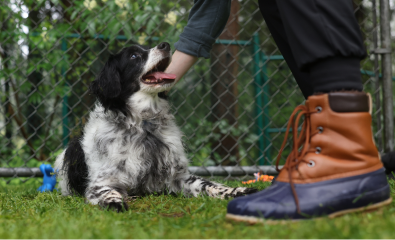

Stick with a routine
Dogs love predictability. Knowing they can anticipate when you’ll arrive home, when meals will appear and when it’s time for a walk will help keep your dog’s anxiety to a minimum.


Accessorize
There are a variety of products on the market intended to help calm your dog. Ask your veterinarian for a recommendation that could help address your dog’s stress response in anxiety-inducing situations.
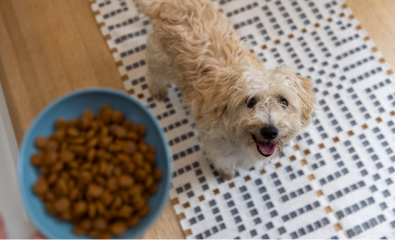

Consider their nutrition
Foods made with highly digestible ingredients can be gentle on upset tummies. Ask your veterinarian about switching your dog’s food and how to do it without upsetting your dog’s stomach any further.
How can you help?
First, if you suspect your dog is suffering from a digestive disorder, talk to your vet about treatments that may be able to help. You can further help your dog by reducing the amount of stress triggers in their environment with some of these suggestions:


Stick with a routine
Dogs love predictability. Knowing they can anticipate when you’ll arrive home, when meals will appear and when it’s time for a walk will help keep your dog’s anxiety to a minimum.


Accessorize
There are a variety of products on the market intended to help calm your dog. Ask your veterinarian for a recommendation that could help address your dog’s stress response in anxiety-inducing situations.


Consider their nutrition
Foods made with highly digestible ingredients can be gentle on upset tummies. Ask your veterinarian about switching your dog’s food and how to do it without upsetting your dog’s stomach any further.
Related products

Pollo, avena entera, harina de trigo, almidón de trigo, glicerina, dextrosa, linaza, grasa de pollo, melaza de caña, agua, gelatina de cerdo, sabor natural, saborizante de cerdo, ácido cítrico para la frescura, sal, saborizante ahumado natural, tocoferoles mixtos para la frescura, extracto de romero.

Pollo, arroz de cervecería, harina de pollo, guisantes amarillos, cebada perlada quebrada, sorgo entero, producto de huevo, grasa de pollo, aceite de soya, arroz integral, pulpa de remolacha desecada, saborizante de hígado de pollo, ácido láctico, saborizante de hígado de cerdo, cloruro de potasio, linaza, vitaminas (complemento de vitamina E, L-ascorbil-2-polifosfato (fuente de vitamina C), complemento de niacina, mononitrato de tiamina, complemento de vitamina A, pantotenato de calcio, complemento de riboflavina, biotina, complemento de vitamina B12, clorhidrato de piridoxina, ácido fólico, complemento de vitamina D3), sal yodada, cloruro de colina, taurina, minerales (sulfato ferroso, óxido de zinc, sulfato de cobre, óxido manganoso, yodato de calcio, selenito de sodio), tocoferoles mixtos para la frescura, fibra de avena, sabores naturales, beta caroteno, manzanas, brócoli, zanahorias, arándanos, guisantes verdes.
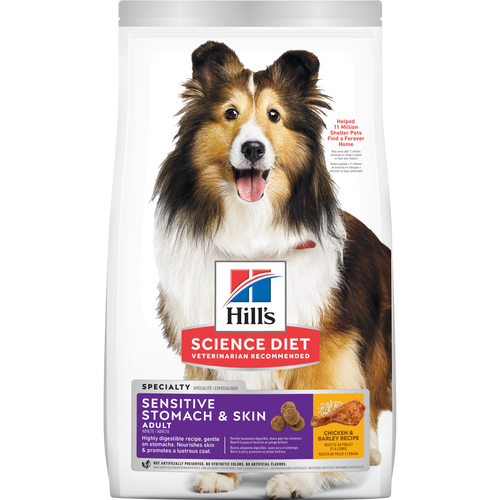
1. Fibra prebiótica para alimentar las bacterias intestinales beneficiosas y apoyar un microbioma equilibrado.
2. Alta digestibilidad para una absorción óptima de nutrientes y una recogida más fácil de las heces.
3. Vitamina E y ácidos grasos Omega-6 para la nutrición de la piel.

Comida altamente digerible que es suave en el estómago. Nutre la piel y promueve el pelusteo.
Related articles

¿Tu perro no come y se la pasa triste? Descubre aquí por qué puede darse este comportamiento en tu perro y qué puedes hacer. Ingresa ya.

Descubre cómo puedes alimentar a tu perra durante la gestación o la lactación para que tanto ella como sus cachorros se mantengan sanos. Ingresa aquí.
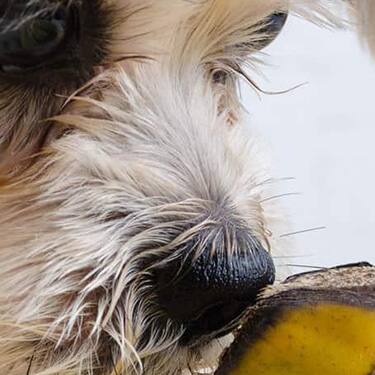
¿Los perros pueden comer plátano? Descubre si puedes darle plátanos a modo de premio a tu peludo y qué hacer si se come uno de estos alimentos.
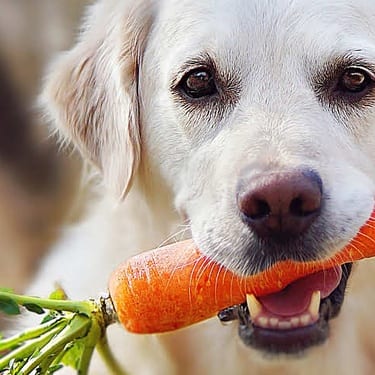
Descubre si los perros pueden comer zanahoria y si son buenas para ellos, los ingredientes que aportan beneficios a su salud y cómo deben comerlas.